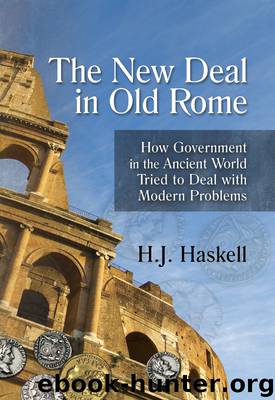The New Deal in Old Rome by H. J. Haskell

Author:H. J. Haskell [H. J. Haskell]
Language: eng
Format: epub
ISBN: 9781610161572
Publisher: Alfred A. Knopf, Inc.
Published: 2011-03-25T16:00:00+00:00
CHAPTER VIII
THE REPUBLIC COULDN’T STAND PROSPERITY
IT was under the Republic that Rome marched farthest, although its expansion continued into the second century after Christ. When Cæsar came into power the little settlement of shepherds on the Tiber had extended its dominion around the basin of the Mediterranean and over western Europe from Gibraltar to the Rhine. A tremendous job it had been. “It was such a toil,” wrote Virgil, “to found the Roman race.”
This vast achievement that affected the whole future of the Western world had been carried out under the direction of a city that had gradually grown from a village to a great cosmopolitan centre. In the last years of the Republic, Rome was not yet the magnificent city it was to become under the Empire. But for the rich it was a centre of luxurious living. They had great mansions on the hills. A rich aristocratic demagogue paid $740,000 for his estate on the Palatine. Much of the value probably was in the land, which had become expensive with the growth of the city. Cæsar later paid $5,000,000 for land which he bought for the expansion of the Forum. It was fashionable to have country estates as well as town houses. Besides his establishment on the Palatine, Cicero had eight country villas to which he liked to retire from the bustling life of the city. The lovely bay of Naples, two days’ journey from Rome, was a favourite resort. Its shores were studded with villas. The living in the great houses was on an extravagant scale. Anyone with the slightest pretensions to social standing must have at least ten slaves, and a well-to-do family might have two hundred. A skilful cook cost five thousand dollars.
The absence of modern transportation facilities caused a concentration of population. The poor lived in wretchedly built flats which often were swept by destructive fires. One of the big business men of the capital became notorious for the way in which he took advantage of the frequent fires for making money. At this time there was no fire department in Rome. When there was a fire he would appear on the scene with a large staff of trained slaves. He would find the owners of the burning building and of buildings that were threatened, and make them distress offers which they were glad to accept. Then his private firemen would go to work to save the property.
Rentals for quarters in the slum districts were cheap. Young Sulla, who was to be heard from later, paid $12.50 a month for his flat. The man who lived in the flat above him paid $8.50. We read of one bachelor in comfortable circumstances who paid $125 a month for his apartment. The poor, of course, had the dole, public baths open at a nominal fee, and the elaborate entertainments of races, wild beast hunts on a temporary platform built in the Forum, and the brutal gladiatorial combats. These last were a survival from the primitive religion of the Etruscans, Rome’s immediate neighbours to the north.
Download
This site does not store any files on its server. We only index and link to content provided by other sites. Please contact the content providers to delete copyright contents if any and email us, we'll remove relevant links or contents immediately.
Pale Blue Dot by Carl Sagan(5007)
The Rules Do Not Apply by Ariel Levy(4969)
Goodbye Paradise(3810)
Ogilvy on Advertising by David Ogilvy(3622)
Liar's Poker by Michael Lewis(3447)
Delivering Happiness by Tony Hsieh(3425)
Into Thin Air by Jon Krakauer(3398)
Purple Cow by Seth Godin(3203)
Rogue Trader by Leeson Nick(3043)
The Social Psychology of Inequality by Unknown(3029)
The Airbnb Story by Leigh Gallagher(2854)
4 - Harry Potter and the Goblet of Fire by J.K. Rowling(2702)
The Mind Map Book by Tony Buzan(2576)
Bossypants by Tina Fey(2532)
Claridge's: The Cookbook by Nail Martyn & Erickson Meredith(2404)
All the President's Men by Carl Bernstein & Bob Woodward(2376)
Six Billion Shoppers by Porter Erisman(2302)
Master of the Game by Sidney Sheldon(2290)
Alibaba by Duncan Clark(2083)
